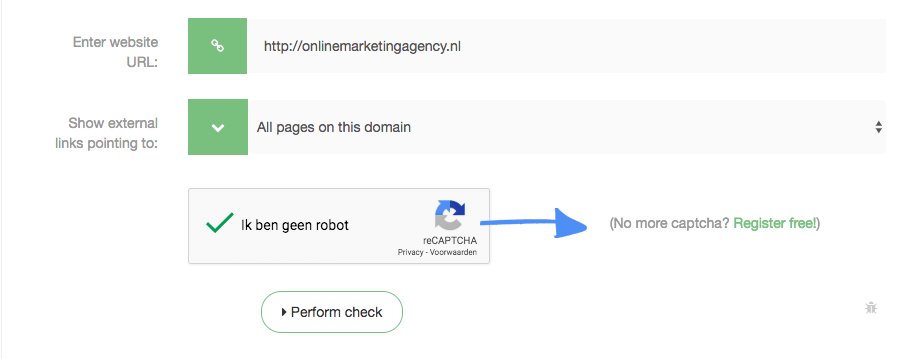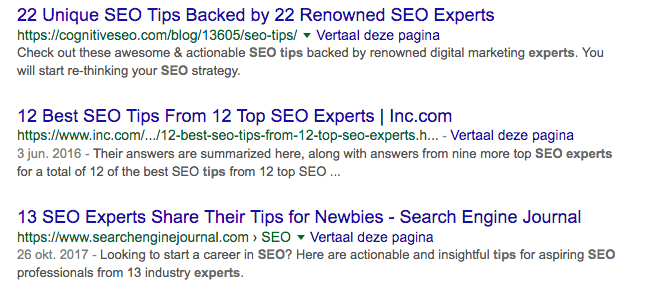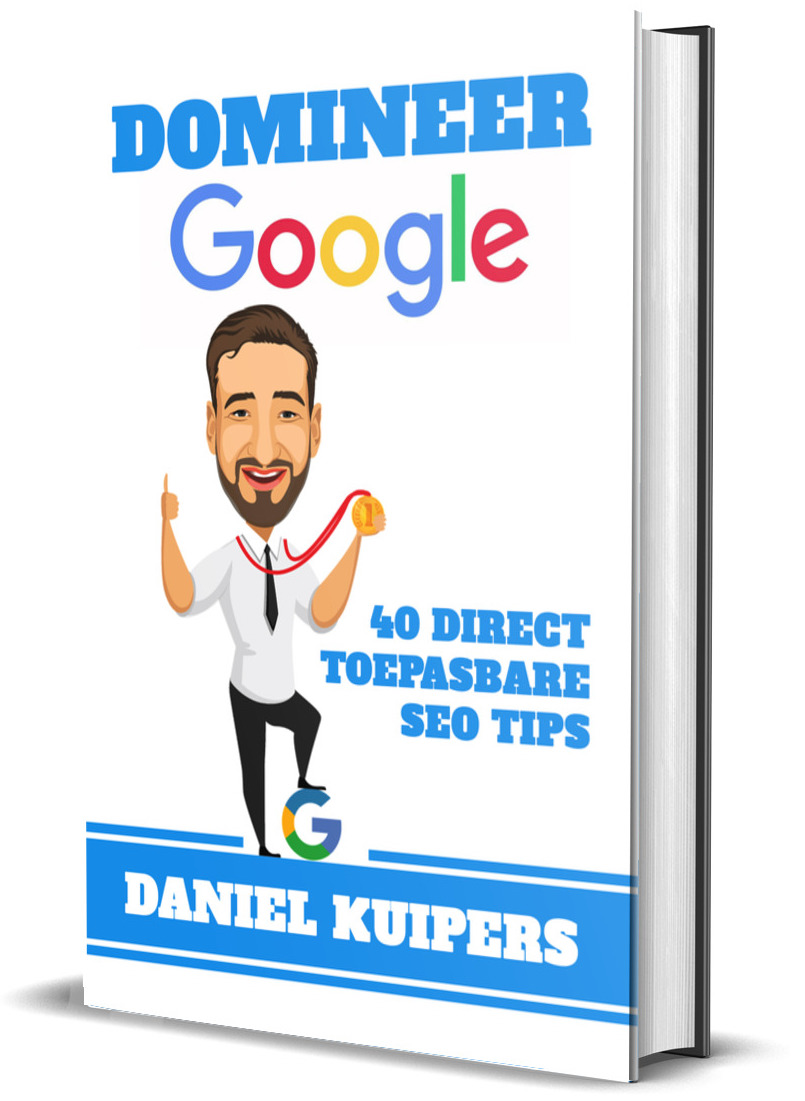Menu
Table of contents
Did you know ... 99.2% of the top 50 results in Google have at least one external link to their website?
What is link building anyway?
Link building is an SEO component that involves linking pages of websites to each other by placing hyperlinks. Placing these links makes it easier for Google (and other search engines) to find, read and rate your website.
You can think of them as a voice or recommendation.
With a link to your website, another website is actually praising yours. Sort of.
After all, who links to a Web site they don't trust? So if you have a lot of links (and therefore a lot of "votes"), that indicates to Google that others see your website as valuable.
And so does Google.
That ensures that with the right link-building strategy, you can rise in Google's organic search results. Some possible ways of link building:
- Publications
- Home pages
- Social media accounts
- Images
Difference between internal and external link building
When it comes to link building, it quickly becomes about external link building. In other words, links from other Web sites to your Web site.
But internal link building is also very important. This is because with internal link building, you ensure that each page is found well and that Google gets to know your website better. In addition, internal link building also ensures that the value of all pages flows through the website.
And that value, in turn, you obtain through external link building. In the SEO world, when it comes to link building, 99% of the time external link building is meant.
Now we move on to the different link building strategies. The most efficient and best working strategies I'm going to explain to you now.
1: Broken links to your own website
The first step is always to check that your website does not have broken links. Broken links are links from other websites to your website that have been modified or not added correctly.
Since these links have already been posted, there is a very good chance that the link can be restored. You do this simply by sending a message to the owner of the website if he wants to change the link or put it back on the website.
But how do you find out which links are broken? To find out which links are broken, you need the right program.
There are several programs that can do this, but my opinion is that Ahrefs is by far the best. Unfortunately, this program costs $179 per month....
But not to worry! Ahrefs also offers a 7-day trial for $7.
So my advice is that you purchase it to find out all the broken links. You can request the Ahrefs trial by clicking here.
Within Ahrefs, you can find broken links under the heading 'Backlink Profile' and then 'Broken'. (See the image below)

You can also use Ahrefs to retrieve lost links. These are links that have expired or been removed.
You can also try to fix those links by sending the website owner a message.
2: Broken links from your competitors
Analyzing your competitors' broken (or lost) links can also be done with Ahrefs! Handy isn't it?
You do this by adding in Ahrefs not your own URL, but by typing in your competitors' URL. Now I hear you thinking: what good is knowing my competitors' broken links?
That's incredibly helpful! In fact, you can send the website owner a message asking him to change that broken link to a link to your website!
Let me explain further ... Suppose ... On the website of a major marketing blog, there is an article on how best to determine keywords.
I found out that the link in the text to my competitor is broken.
Therefore, I contact the marketing blog and ask the question: could the link be modified to the page on my website that is also about determining keywords?
Chances are then they will do this, because the article already exists, adjusting it does not require much effort, and because they obviously want to serve their readers as well as possible. I personally find this one of the best ways to get quality links. In fact, I have found that the success rate is very high.
3: Link profile of your competitors
Looking for websites yourself where you can find out a link can be incredibly time consuming. Therefore, it is much faster and easier to study your competitors and see where their links come from.
You can do this with Ahrefs, but if you don't want to pay, you can also do it with a free backlink tool like Seoreviewtools. Finding out the link profile with Seoreviewtools is done as follows:
- Click on the link above
- Enter your competitor's domain
- Set 'This page' to 'All pages on this domain'
- Click the Captcha
- Click on 'Perform check'
This then looks like this:

Once you have clicked on Perform check you will be presented with a laundry list of links. Now it is up to you to copy, request or create these links.
4: Your own network
This is a strategy often forgotten....
Have you already asked friends/family/partners or acquaintances who have a Web site if they would like to link to your Web site on theirs? Chances are you haven't yet, but your network wants to do so.
A few examples of using your own (business) network to promote your link profile:
- If you are a web designer who has built a website, you can put a link to your website at the bottom of the footer.
- Ask your supplier if they want to put a link on their website because you sell their items.
The advantage of this strategy, provided someone is in the same industry, is that the link is placed on a very relevant website. In addition, it is also incredibly convenient for visitors, because they can click through to the website builder or seller, for example.
5: Top lists
Top lists are lists in which experts give their opinions, for example. To make this clearer, I will focus this on my own business.
In the world of online marketing, there are an awful lot of self-proclaimed experts. We are going to take advantage of that.

There are many such lists on the Internet. What I can do now is to approach these websites asking: can I also be added to the list?
Chances are you will be added, provided you have a good story. It is also possible that the website may ask for consideration.
This could be money or a back link, for example. Always be careful with this, though, because Google doesn't actually like that very much.
6: Guest blogging
Guest blogging is a strategy that is very time-consuming, but is perhaps best in terms of quality. It is nothing but writing blogs for other websites.
When you link in the blog, this in turn provides value for your website. The gain for the website you guest blog on is that they get "free" content and they can garner visitors in Google with this content.
For guest blogging, I have some three tips for you:
- Don't simply ask if you can guest blog for a party. Establish a long-term relationship, introduce yourself and tell who you are and what you want.
- Always ask what kind of person/content they are looking for. See if this matches you and your content.
- Don't write the guest blogs for the link. Write the blogs for the website visitor (because that will get the article shared faster and more often, resulting in even more links).
7: Post good content
This tip is pretty cliché ... Yet, posting good content is incredibly important in your link building strategy.
And when we talk about content we are talking about text, images, videos or a mix of these three. After all, when you post strong, unique and fun content, it may be picked up by third parties.
These third parties can be the news, forums, competitors, partners, those interested in your service/product and so on. It is especially important here that you know who your target audience is and that you also write for this audience.
Some examples of content:
- Blog
- Share reviews/experiences
- Webinairs
- White papers
- Case studies
- Newsletter
- Infographics
- Podcasts
- E-book
8: Publications
Regular publications are often overlooked. Links in press releases, reviews or news releases are often forgotten.
This is due to the fact that the writers of those publications are often not concerned with SEO and thus link building.
If you see that the links have been forgotten, get in touch to ask them to still add the links.
Of course, it can also happen that something is written about you but you don't know it. I have 2 tips for that!
First, you can set up a Google alert on your company name or the service you offer. Then, the moment something is written about you, you'll get an email about it.
Immediately check the article for any links and, if necessary, ask them to add the link. There are also online reputation management tools, such as Coostco or Sprout Social.
With these tools, you have insight into your online reputation: you can see what is being written about you on the Internet and anticipate it.
With these 7 tips, you can work on your own to get a better link profile, grab higher positions in Google and beat your competitors! Success.
This article was written on July 18, 2018 and updated on Sept. 30, 2021.











Written by: Daniel Kuipers
Daniel is the founder of Online Marketing Agency. He constantly scours the Internet for the latest gadgets and tactics and blogs about them in understandable language. Well, sometimes.